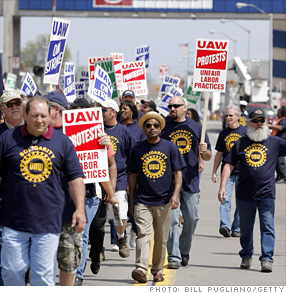
GM, Ford and Chrysler all hire union workers to work in their U.S. factories. But their Asian competitors have based most of their U.S. factories in Southern "right-to-work" states where companies don't have to hire union staff. Combine that with an overall younger workforce with fewer retirees, and Asian automakers have big cost advantages in the U.S.
But even the Detroit automakers themselves don't claim to pay more than Asian automakers working in the U.S. GM estimates its hourly pay for an assembly line worker is about the same as that of someone working for an Asian manufacturer here.
The differences come from retirement and health-care. Detroit automakers pay a lot more per worker-hour because they have more retirees to whom they extend full health-care benefits.
What's to come: The UAW recently made significant concessions that should save GM, Ford and Chrysler a lot of money in the long run.
The union allowed Detroit automakers to pay newly hired workers less per hour than previously hired employees. It also agreed to take over the cost of retiree health care provided the automakers paid lump sums into an investment fund to cover the costs.
NEXT: Fat executive paychecks
